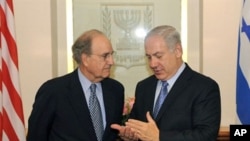Israel and the Palestinians resumed peace talks in May, after a 17-month break in the negotiations. The U.S. is once again facilitating talks between the parties in the latest effort to bring peace to the region. Some Middle East analysts and former negotiators, however, are beginning to question the diplomatic approach to the conflict.
For nearly 40 years most U.S. presidents and their diplomats have been heavily involved in trying to bring peace to the Middle East.
Since the term peace process was coined and used by former U.S. Secretary of State Henry Kissinger, who negotiated an end to the October 1973 Arab-Israeli War, America's highest level diplomats have made countless trips to the region in an effort to end the Israeli-Palestinian conflict.
Now U.S. envoy George Mitchell is trying to get the negotiators back to the table through indirect talks by shuttling between Jerusalem and the West Bank.
"I look forward to continuing our efforts to achieve comprehensive peace and security in the region, including a two-state solution," said George Mitchell.
Writing in the current issue of Foreign Policy magazine, Aaron David Miller, a veteran of the Middle East peace process who advised six U.S. Secretaries of State, says the region has changed dramatically, becoming what he calls "nastier and more complex."
Miller strongly questions whether U.S. President Barack Obama can accomplish what a long line of his predecessors failed to do.
"Can an American president substitute his own sense of urgency and leadership, for the absence of urgency, ownership and partnership in the region? I think not, but that is the proposition that this president is about to test," said Aaron David Miller.
Miller's article has sparked conversation from Washington to Jerusalem, because the author says he is no longer a believer in the basic core principles of the peace process after decades of what he calls "inflated hopes followed by violence and terror."
Marc Lynch, the Director of the Institute for Middle East Studies at George Washington University, agrees that a new approach is needed.
"After all these years of trying and failing to bring about Middle East peace and after the frustrations of the last year with the Obama administration trying so hard that maybe it is time to take a step back and rethink first principles [main beliefs]," said Marc Lynch. "In other words if you bloody your forehead by running into the wall a few times is the answer to move back and then run faster into the brick wall or is it to maybe try something different?"
Daniel Levy, Director of the Middle East Task Force at the New America Foundation, argues that so many factors affecting the peace negotiations have changed, that the approach itself must be altered to recognize the new realities on the ground.
"I don't get it," said Daniel Levy. "I don't get, when you are almost two decades into this, when in that two decades the Palestinian national movement has collapsed, the one significant event that happened in terms of withdrawal, withdrawal from Gaza happened outside the context of the peace process, the Israeli peace camp has collapsed, the historical national leader on the Palestinian side [Yasser Arafat] has passed away, etc., etc., that we are still trying to go about doing it the same way."
Rob Malley is the Director of the Middle East and North Africa program at the International Crisis Group.
Malley was a U.S. negotiator at Camp David in 2000, when the Israelis and Palestinians failed to reach a comprehensive peace agreement.
That failure is often cited as a reason for the breakout of the second intifada, the violent Palestinian uprising against Israeli occupation.
Malley says the current atmosphere in the Middle East severely hurts efforts to reinvigorate the peace process.
"I think we have to change the regional climate," said Rob Malley. "The notion that the U.S. is going to do something at a time when Syria, Iran, Hamas, Hezbollah, plus the echo chamber of Al-Jazeera, are going to be unanimously against what the U.S. is doing and when Egypt, Jordan and others are sort of losing steam seems to me to be a complete illusion, a myth."
Aaron David Miller, who also was a U.S. negotiator at Camp David, says he is concerned another failed round of peace talks could ignite more violence.
"It took a decade for the Israeli-Palestinian relationship, which is still broken, bloodied and battered as a consequence of the 10 years between the failure of Camp David and now to become marginally functional, what are the prospects and the implications and consequences of going into the breach one more time and not succeeding? That is what I worry about," he said.
The Palestinians want a state in areas Israel captured in the 1967 Middle East War, with East Jerusalem as a capital.
Israeli Prime Minister Benjamin Netanyahu has accepted the idea of a Palestinian state, but with conditions and without East Jerusalem.
Mr. Netanyahu is scheduled to meet with President Obama at the White House June 1.
Middle East Analysts Question US Diplomatic Peace Efforts










